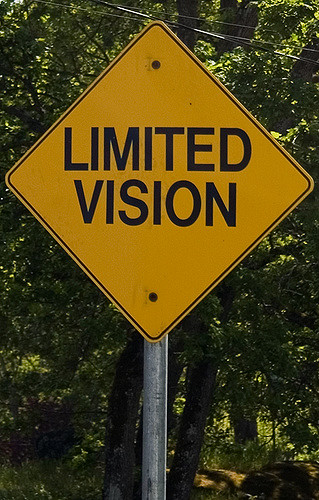Did you ever notice how some things really grab your attention but not the attention of others? Or how you edit out the background noise in a bustling restaurant when you want to hear what someone at your table is saying? That’s selective attention. Both consciously and unconsciously, we edit our environment and pay attention to some things while ignoring others. With the increasing bombardment of stimuli we deal with each day, this capability becomes more and more important to us to sort out what matters to us and what doesn’t. On the other hand, sometimes we edit out very important and useful information.
I thought of this the other day when I saw a chipmunk determined to cross the road. In front of him were four busy lanes of traffic and a huge parking lot. Behind him was an enormous lush field. What was he thinking? What did he imagine was more desirable in the road and parking lot than in the field? I still wonder what happened to that chipmunk.
This got me thinking. How often do I do that to myself? How often do I set my mind on doing, being or having something and ignore all other possibilities that might help me make a more informed decision? Just because I think something, doesn’t make it so, nor is it necessarily a good idea.
It’s very easy to assume our point of view is a perfect match to reality. Unfortunately, anyone with a different opinion or any conflicting information available to us gets either rejected or ignored because it doesn’t fit our picture. This process of selective attention operates both automatically and consciously, but doesn’t always serve our best interest — like the chipmunk above.
Experts in the field of psychology and psychiatry hotly debate the question of how and why we select to pay attention to some things and not others. They also disagree about the degree to which this editing process is conscious. Typically, we filter out what we deem to be unnecessary or unimportant without being aware of the fact that we are exercising this filtering process. As a result, what we think is not necessarily so. It is simply a result of our beliefs, prior experiences, the arousal of our senses and other factors that play a role in our editing function.
Extreme problems with the selective attention function are evident in individuals with Attention Deficit Hyperactivity Disorder (ADHD) who have difficulty focusing their attention, while those with Autism flood their senses by paying attention to too much at once. Then there are the rest of us. Consider, for example, teenagers who selectively do not pay attention to parents who repeatedly try to get them to do their chores. Or, the woman who ignores the warning signs of abuse from her partner because she doesn’t want that to be true. Or the endless party politics where each side tries to outshout the other with their talking points, never really listening to opposing views.
The advertising industry is built on selective attention. Look at my product! Look at this beautiful model and buy into the illusion that you too will look this great if you buy my product!
In observing my own behavior, I notice that my selective attention really supports me well when I am writing and able to edit out all distractions except my cats — but they delight me so I don’t want to change that. I notice I am very task-oriented. When I choose to do something, I focus my attention on it and get it done. On the other hand, sometimes my attention is non-selective. For example, during meditation when I have difficulty shutting off my mind. Also, when I go shopping, I don’t always selectively attend to my shopping list. I give myself too much freedom to be distracted and seduced by non-essential purchases.
Selective attention, while often unconscious, is a powerful tool when exercised consciously. It can work for us or against us depending on the situation. Here are some suggestions about how to hone your selective attention skills so that you can use them more to your advantage:
Do a selective attention audit on yourself:
- When do you see selective attention working for you and when does it get in your way?
- Notice how often you choose to ignore warning signs or negative implications and why.
- Notice when you are talking with someone, whether you focus your attention on the conversation, zone out or divert your attention elsewhere.
- When multi-tasking are you aware of where you are placing your attention or is it simply fragmented?
- When making a purchase do you make it a point to look at both the pros and the cons or just talk yourself into the purchase by only focusing on the positives?
- Who do you choose to listen to and who do you choose to ignore and why?
- Do you notice any differences between how you pay attention to people and things that you like versus those you don’t?
Practice using your selective attention to better advantage:
- Choose one area of your life where you tend to get distracted and practice intentionally holding your focus where you want it to be.
- Observe yourself in an area where selective attention works for you and notice how you do that. Then see where you can apply that elsewhere in your life.
We are selectively focusing our attention all the time. The real question is how aware of it are we? The more conscious we are of this process, the more opportunities we have to direct our attention to our advantage.
I welcome your comments.
If you would like to know more about me and my work, please explore my website here.
Also, if you know anyone who might get value from this article please email or retweet it or share it on Facebook.






